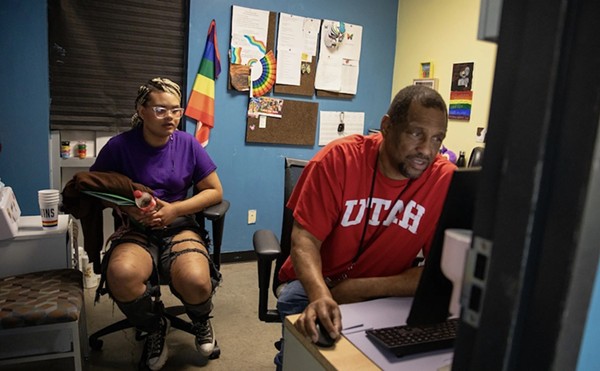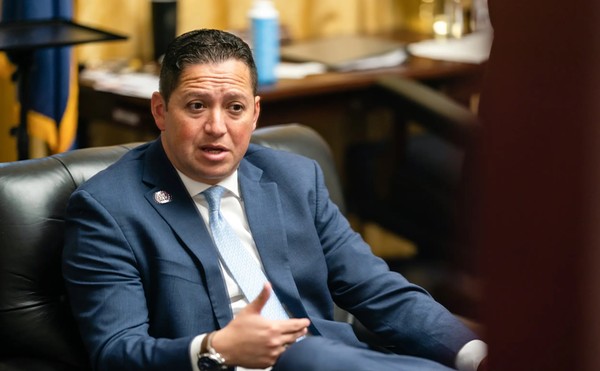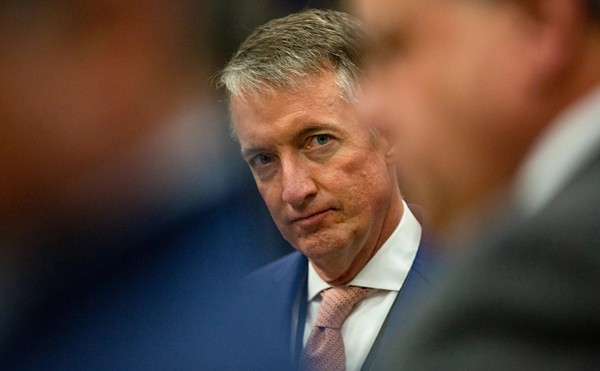Phil Hardberger likes to say that the San Antonio City Council is a family. At times, a backbiting, frustrated bunch of sibling rivals, but a family nonetheless.
From the moment he assumed the mayor’s office in 2005, Hardberger has taken the old-school, head-of-the-table (or head-of-the-dais) role of family patriarch: alternately stern and reassuring, a spoonful of the Great Santini mixed with a generous serving of Andy Griffith, and always in unchallenged command. Like children who resent their parents’ authority but crave their approval, Council members sometimes grumble about the way Hardberger tightly controls their agenda, but publicly gush about his leadership skills.
Largely because of his formidable personal popularity, Hardberger has wielded more political power than any SA mayor since Henry Cisneros. He’s frequently employed that power to generate momentum for causes with broad appeal: Mission Verde’s green-energy vision; Haven for Hope’s compassionate boost to the homeless; and the city’s investment in additional park acreage.
The downside of Hardberger’s activist stance, however, has been an impulsiveness, an impatience with the governing process, and an indifference to the issue of transparency. While it’s hard to find a local political figure who is not mesmerized by the glow of infallibility that surrounds Hardberger and Sheryl Sculley, the city manager he lured from Phoenix nearly four years ago, the one (generally mild) criticism you’ll hear concerns process. In culinary terms, Hardberger and Sculley make good omelettes, but they break quite a few eggs along the way.
Mayor-elect Julián Castro went to great lengths during this year’s campaign to assure voters that he admires the performances of Hardberger — the man who bested him in a bruising 2005 mayoral race — and Sculley — the woman who backed out of an April 2005 bid for the city manager position when Castro’s opposition to her proposed contract made it clear she didn’t have unanimous Council support. But when I asked Castro how his form of leadership would differ from that of the outgoing mayor, he quickly pointed to the governing
process.
“Sometimes the issue of public process has been a challenge,” Castro says. “There’s an inherent tension in public service, between getting things done and living up to the best ideal of democracy — including the public, doing all the public hearings, and meaning it. The Mayor and the City Manager generally have been able to balance those things well, but at different moments, it could have been done better. I look forward to working with the City Manager to see how we can enhance the public process.”
Even a cursory examination of Hardberger’s record over the last four years reveals a consistent pattern: The mayor predetermines what course he wants to take, and rushes it through the Council with minimal discussion or debate. He did it with the Main Plaza renovation, the hiring of City Attorney Michael Bernard, the creation of a new Council audit committee, the recent appointment of three SAWS Board members, and most audaciously, with the approval of a lavish contract extension for Sculley last December.
With Hardberger closing out his four-year tenure, Sculley preparing to work with a new mayor, and at least four new Council members who will face less restrictive term limits than their predecessors, we will likely see a shift from the cheerful autocracy of the Hardberger-Sculley axis toward a more balanced relationship between the mayor and Council.
“People forget it’s a council-manager form of government, not a mayor-manager form of government,” says District 10 Councilman John Clamp. “You have a popular mayor, and that’s what happens. I would have liked to see a lot more discussion. That way you avoid a lot of these fireworks at City Council.”
When Hardberger earned a narrow, hard-fought runoff victory over Castro on June 7, 2005, few could have predicted what a dominant force the new mayor would become. Nearing his 71st birthday, with no experience in city government, and no obvious public mandate, Hardberger looked like a transitional figure who would serve one term and clear a path for the next generation of SA leadership.
The Hardberger Myth, however, began with his behind-closed-doors gambit to coax Sculley to reconsider San Antonio. When she accepted the offer, Hardberger immediately took on the aura of a man who could accomplish what his predecessor, Ed Garza, tried and failed to pull off.
Hardberger and Sculley have been politically attached ever since. He staked his reputation on her, and she gave up a blossoming career in Phoenix for him, so self-interest (even self-preservation) dictated that they help each other succeed.
The same week that Sculley accepted the San Antonio job, Hurricane Katrina hammered New Orleans, sending thousands of evacuees to this city, and burnishing Hardberger’s reputation as a cool customer in a crisis. Even when he made a tacky public bid to steal the New Orleans Saints away from their devastated home city, he couldn’t undo the good will he’d already stockpiled.
“Phil could look like a Republican and talk like a Republican, but he also had enormous street cred in the inner city, and Ed `Garza` couldn’t quite put that same thing together,” says former District 10 Councilman Chip Haass, who served his first term under Garza, and his second under Hardberger.
The Hardberger team came in with a mantra they’d borrowed from Nike: “Just Do It.” Haass says Hardberger’s lack of experience with Council procedure actually worked to his benefit, because whenever the former judge bypassed the traditional process, observers tended to be more forgiving.
City Hall insiders say Hardberger quickly consolidated his power in several ways. He restructured Council committees, eliminating and combining them in ways which bumped councilmembers off prized assignments (thereby reducing the power of individual councilmembers), and reduced the role of public debate in the governing process, which had been one of the more positive elements of Garza’s much-maligned administration. In addition to hiring Sculley, thereby ensuring himself an ally in the city manager’s office, he picked a longtime family friend, Michael Bernard, to be city attorney. While previous city attorneys had been known to give the city manager their utmost loyalty, Bernard, by all accounts, was solidly in Hardberger’s corner. Council insiders say that Hardberger, as he would do with future City appointments, privately told Council members who he’d chosen, and made it clear that he expected them to rubberstamp his selection.
Most crucially, Hardberger simply bypassed the established rules for getting items on the Council agenda. During Garza’s administration, the mayor and Council members were required to provide a memo with six signatures of support from their colleagues in order to put an item on the agenda. After Hardberger took office, the six-signature memo for Council members changed to a five-signature memo, but, unlike Garza, Hardberger did not bother to play by the rules that governed the rest of the Council. Whenever he wanted an item on the agenda, he simply added it, without bothering to get the required signatures.
“Other Council members have said, ‘How do we get things on the agenda? It seems like whatever the mayor wants, he can get on the agenda, while we have to go through this other process,’” says District 7 Councilman Justin Rodriguez, who counts Hardberger as a friend, but has been willing to challenge the Mayor on hot-button issues.
“I’ve never had a problem getting anything on the agenda, and I don’t have a problem with the Mayor as the chairperson helping set the agenda. That’s one of the perks the Mayor gets. But there has been a communication issue, and we’re all guilty of it to a certain extent.”
Clamp argues that getting an item on the agenda is “half the battle” for Council members and says, “It should be the same for the mayor, because the mayor is a Council member just like anyone else. If there’s anything on the agenda, it should be done through five-signature `memos`, with the exception of the operational things that the city manager does.”
Hardberger’s first major use of his political capital came with the renovation of Main Plaza, a project which has subsequently become so identified with the Mayor that it’s often called Hardberger Plaza. In 2005, he muscled the $10-million project through Council, despite public misgivings from business leader Tom Frost, County Commisioner Tommy Adkisson, and District 1 Councilman Roger Flores. The project has been riddled with problems, from an $8.2-million cost overrun to traffic congestion caused by the closure of the plaza’s bordering streets to complaints that the renovation’s design did not properly take wheelchair accessibility or the need for shade into account.
“I think there were a number of people on the Council who might have had some concerns about Main Plaza, but you weren’t about to oppose Phil Hardberger,” Haass recalls. “He had such a high approval rating, and there was so much positive publicity for him, you did not want to be the first one out of the box to take him on.”
In a pattern that has repeated itself throughout his two terms, the politically savvy Hardberger heard the growing chorus of grumbles and compromised just enough to appease his critics without giving up his broader goal. In 2006, he agreed not to close off Commerce and Dolorosa, the streets on the north and south borders of Main Plaza.
Hardberger adopted a similar strategy last month, when local environmentalists complained that he pre-selected three new SAWS Board members, without interviewing other interested candidates. The environmental community supported water expert Jerry Morrisey for the Northeast Quadrant position, but by the time the appointments came up for public discussion, Hardberger had already picked outgoing District 9 Councilman Louis Rowe for that slot.
“I was just really, really surprised that for such important positions that the whole process was not more transparent,” says Annalisa Peace, executive director of the Greater Edwards Aquifer Alliance, who notes that prior to Hardberger’s administration, the Council interviewed all SAWS Board applicants before making their selections.
At the Council’s April 16 meeting, Hardberger preemptively smothered any political fires by urging Council to wait three weeks to enable all worthy SAWS Board candidates to get full consideration. Three weeks later, having dispensed with the rituals of transparency, he united the Council behind the man who’d been his choice all along: Louis Rowe.
Clamp, whose district will essentially be represented on the SAWS Board by Rowe, openly complained that the Mayor gave him no voice in the selection.
“The Mayor wanted to put Louis Rowe on the board,” Clamp says. “And that’s what happened. So there was no real transparency there. He basically told me, ‘I want it to be Louis. I want to work with you, but Louis is my guy.’
“He didn’t want to hear anything about my candidates or an open process. It was just, ‘Louis is a good guy. He knows about water. And that’s the way it’s going to be.’”
Clamp also expressed frustration with Hardberger’s my-way-or-the-highway form of leadership last year when, in the aftermath of the controversial firing of City Auditor Pete Gonzales, the mayor restructured the Council’s Audit Committee to include two private citizens along with three Council members. Clamp argues that a municipal committee that includes private citizens should not have the decision-making powers of a Council committee. He says that Hardberger “convoluted the message” by altering the audit committee.
During his stint as city auditor, Gonzales often found himself at odds with Sculley and Bernard, and points to the City Manager’s handling of San Antonio’s contract with Texas Towing as a prime example of how the Council could be swayed by her. Gonzales says Sculley predetermined that she wanted to give Texas Towing’s contract to an out-of-town firm and, with Bernard’s help, built a dubious case against Texas Towing.
Gonzales says his own audit of Texas Towing found that the company had fulfilled its duties, and that the City actually underpaid them by $22,000 over a three-year period.
“In my opinion, the City was not trying to resolve this,” Gonzales says. “The City Manager’s office was trying to put all the blame on Texas Towing, and to manipulate the Council. The City Attorney said, ‘This is one of the worst-run contracts in the City.’ Well, that’s not true. It was propaganda.”
Even after two years on the Council, Clamp expresses amazement when Council members must jump through committee and consensus-memo hoops while City agencies such as CPS and SAWS, with the blessing of Hardberger and Sculley, can get a proposed rate increase on the Council agenda anytime they choose. He says “there’s no accountability and responsibility” under this system, because Council members don’t have to attach their names to a memo supporting a rate increase.
When CPS pushed for a 5-percent rate increase last year, Rodriguez argued that the hike was excessive. He says Hardberger’s office informed him that the terms of the rate increase were “not negotiable,” to which he responded “everything’s negotiable.” In a rare instance of the Council rebelling against Hardberger, they settled on a 3.5-percent hike, which the mayor grudgingly accepted.
One of Hardberger’s political tricks has been to create an artificial sense of urgency around an issue, as he did with last December’s passage of a three-year contract extension for Sculley. It was the Council’s final meeting of 2008, and one already guaranteed to be loaded with unfinished business. With Sculley’s contract not set to expire for nearly a year, no one — other than Hardberger — viewed a contract extension as an issue that demanded immediate attention. With little warning, Hardberger attached the proposal to the Council agenda, with no supporting memo explaining the details of the new contract. Rather than providing Council members with sufficient time to closely examine the contract, he briefed them individually about its general terms. Only Rodriguez read the contract before voting on it, and, not coincidentally, he was the lone Council member to vote against it, arguing that it provided too much wiggle room for Sculley to leave San Antonio with a handsome severance package.
Clamp says he wondered at the time how the Sculley contract made it to the agenda and jokingly asked her if she’d placed it there. “When I told her that, she looked at me like I was crazy,” Clamp says.
Both Rodriguez and Clamp say that former Council members have told them that dialogue was more common during Hardberger’s first term. Rodriguez says that when Roland Gutierrez and Kevin Wolff vacated their positions mid-term, it threw the Council into “a kind of free-for-all. And then you had a colleague early on `Diane Cibrian` who had mayoral ambitions. That completely threw a wrench into everything. Instead of being a little bit more cohesive, there was a certain level of competition amongst colleagues.”
Additionally, by the time Hardberger began his second term, he and Sculley had solidified their local reputations, and no Council member had much hope of winning a battle with either of them.
“The Council should have rules on how to conduct meetings,” Clamp says. “I’ve tried in executive session to say we need to have rules, and we need to do this and that, and the way politics works, it ain’t gonna happen unless Castro — and the majority of the Council — wants it to happen. I hope it happens, because it’s the right thing to do. But it’s not going to happen under Hardberger’s watch.”


















